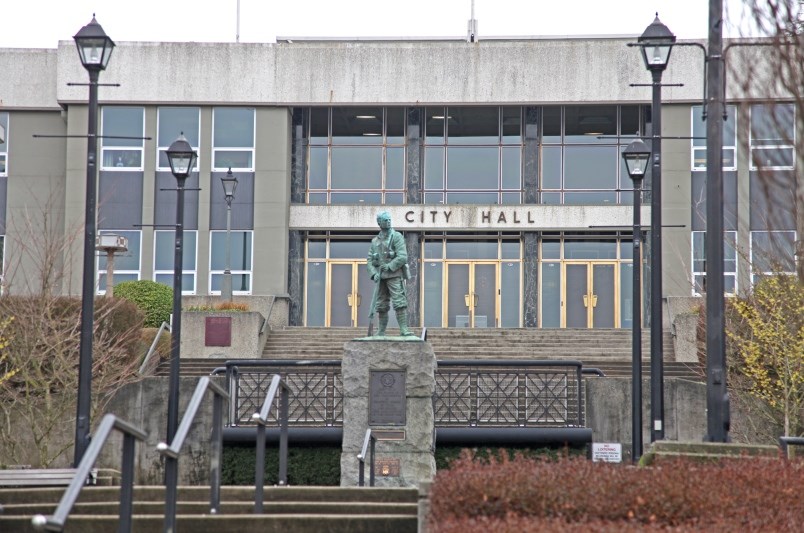As Canada encounters an “unreliable” trading partner, New Westminster is recommitting its efforts to procure products made in Canada.
At Monday’s meeting, council received an update from staff about the city’s procurement strategy for Canadian-made products. The report stated that 97 per cent (2,699 out of 2,788) of the vendors the city has or currently uses are Canadian.
“The city’s practices around procuring goods and/or services has always been to source Canadian-made alternatives first before sourcing foreign-made products,” said a report to council from Shehzad Somji, the city’s chief financial officer. “There are circumstances where Canadian-made products are not available or may be cost-prohibitive. If the cost variance is 10 per cent or less, the city would procure the Canadian product.”
In situations where a Canadian product may not be available, the supervisor has recently implemented sourcing offshore products prior to American products, said the report.
The report comes at a time when Canada’s trade with its largest trading partner, the United States, is strained.
U.S. President Donald Trump announced on Feb. 1 that 25 per cent tariffs would be imposed on Canadian imports (10 per cent on oil and gas) to the United States beginning Feb. 4.
“The Canadian prime minister announced retaliatory measures to the U.S. tariffs on Canadian steel and aluminum and announced that Canada was imposing 25 per cent tariffs on $155 billion worth of U.S. goods,” said the report. “An agreement to temporarily pause the tariffs for 30 days was reached on Feb. 3, 2025 between the Canadian prime minister and the U.S. president.”
On Monday, Trump signed orders imposing 25 per cent tariffs on all steel and aluminum imports, including those coming from Canada. Those tariffs are set to go into effect on March 12.
“This is just a report that we asked staff to put together quickly in response to some of the situation that's going on geopolitically around the world, around tariffs and around other levels of government who are talking about changing their procurement practices,” said Mayor Patrick Johnstone. “I wanted a report back on what our procurement practices are and whether we have any ability to address them.”
The report included a staff recommendation that council receive the report for information.
In addition to receiving the report for information, Johnstone put forward a motion that council:
- direct staff to explore, including the country of origin, in their regular major purchase reports to council. (Staff report to council several times a year on the major purchases that have been made by the city.)
- direct staff to report to council prior to making significant purchases where staff are only able to source from U.S. companies, including consideration if a purchase could be deferred or if an alternative can be identified.
“I’m asking staff just to provide us a little bit more information to council so that we can make decisions if those decisions are necessary, considering steel and aluminum tariffs started today,” Johnstone said. “It's a constantly changing landscape.”
Noting the aluminum and steel tariffs, the overall U.S. tariffs on Canadian imports, and the “pattern of essentially harassing Canada,” Coun. Jaimie McEvoy said the United States is an “unreliable partner in trade” and is unreliable in terms of cost and access to goods.
“You can't deal with unreliable partners. You have to find reliable partners,” he said.
McEvoy noted Canada had an auto pact with United States from 1965 to 2001, which ensured that parts for American cars were manufactured in Canada.
“And then came along free trade, and we dropped the auto pact,” he said. “Well, the free trade (agreement) isn't worth the paper it's written on now. … We don't have free trade anymore. And you can't have that situation where one party is playing by the rules, no matter how badly it gets beat up in the process, and the other party is going to come into the ring bare-knuckle.”
McEvoy supports efforts to buy Canadian-made products and to support New West and Greater Vancouver businesses as much as possible. He noted some businesses may require products made in the United States.
“We all need to do the best we do, but let's be Canadian and be patient and kind with each other as we find our way through this as best we can,” he said.
U.S. travel
Coun. Daniel Fontaine questioned if the City of New Westminster has taken steps to halt any work-related travel to the United States by city staff.
Lisa Spitale, the city’s chief administrative officer, said the report focused on the city’s procurement related to services and equipment.
“I would prefer that we're not sending any staff to the U.S. We're not purchasing anything while this trade dispute is going on,” he said.
Fontaine proposed an amendment stating that council direct staff to not undertake any work-related travel to the United States until further notice. After hearing about potential impacts to a total travel ban — including staff, such as firefighters, who may require certain certifications only available in the U.S., Fontaine’s amendment was further amended to ban non-essential work-related travel.
Council unanimously supported Johnstone’s motion and Fontaine’s amendment.
The report, however, prompted questions from Fontaine about how it was initiated and got on the docket so quickly. He said staff reports generally come from staff or council direction.
“There was a request from council to add this as a last-minute report,” Somji said. “But also, I think it was timely, because late last week, City of Vancouver also put out some information as far as their local purchasing; statistics as far as the percentage of vendors that they have that are Canadian vendors, versus across-the-border or overseas vendors.”
Johnstone said he asked staff to report back to council about the city’s procurement policy, given the economic situation between Canada and the United States.





